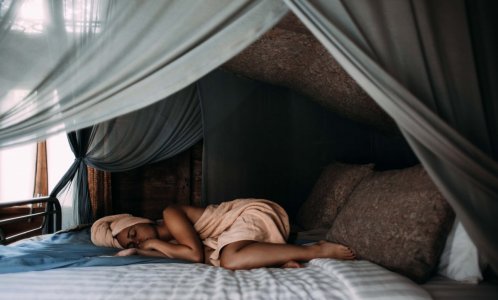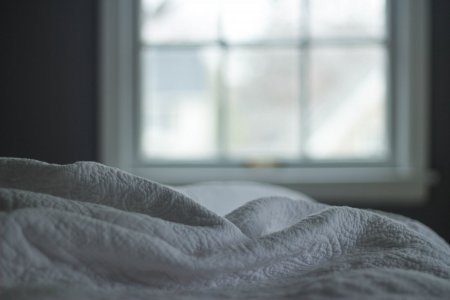Do you wake up feeling tired? Bad posture could be to blame.
- Replies 2
We all know how important a good night’s sleep is for our overall health, yet most of us don’t get nearly enough. The average Aussie only manages to get around 6.9 hours of sleep each night, when we should be aiming for between 7 and 8.
Many factors can affect how well we sleep at night, and one of them is our posture. While we might not think too much about the way we lie down when we’re trying to drift off to dreamland, it can have a big impact on the quality (and quantity) of our slumber.
According to The Sleep Doctor, Michael Bruce, bad sleeping habits could harm you without you even realising it. ‘Think about it this way – how you carry yourself while you are awake is a key factor in how you perform throughout the day,' he told reporters.
‘If your daytime posture is good, you are likely to feel good throughout the day. However, if your posture is bad and you are slumped over, you'll feel pain and not so great during the day.’
The Sleep Doctor claims that your posture while you sleep requires three things:
1.) You have to have the right sleep position.
2.) You have to have good sleep equipment.
3.) You need to be mindful of your body’s natural alignment from head to toe.
‘Poor sleep posture will make it so that when you wake up, you are aching in pain.’ Dr Michael also says that you will inevitably get stiffness in your joints and certain pressure points.
According to a study conducted in 2017, 54% of people sleep on their sides, 37% sleep on their backs, and only about 7% sleep on their stomachs. So, which sleeping position is best for you?
Well, Dr Michael suggests that if you are aiming to get the deepest possible sleep, and you don’t have sleep apnoea, then sleeping on your back is the best way to go.
‘If you don’t have sleep apnoea, then back sleeping – I would argue – is the best because you can displace weight across your skeletal frame and stay aligned.’ he said.
If you have sleep apnea or tend to snore, sleeping on your side will be better for you. ‘This is because your anatomy will fall towards the front of your mouth,’ Dr Michael explains.
The sleep expert also shared some tips to get a good night’s sleep. First, is to look at your environment. ‘Is there anything that could be causing you stress? Clean out your bedroom, make a clean space for you to sleep,’ Dr Michael suggests.
He also advises that people should wake up at the same time every morning. Lastly, Dr Michael recommends limiting the intake of caffeinated beverages to one or two a day. ‘Have them before noon, and you will definitely have a better night’s sleep.’

We also wrote an interesting article on CPAP machines for anyone interested in learning more!
What can you say about this, members? Are you keen on trying out Dr Michael’s suggestions? Tell us your thoughts in the comments section, and share your tips for a good night’s rest!
Many factors can affect how well we sleep at night, and one of them is our posture. While we might not think too much about the way we lie down when we’re trying to drift off to dreamland, it can have a big impact on the quality (and quantity) of our slumber.
According to The Sleep Doctor, Michael Bruce, bad sleeping habits could harm you without you even realising it. ‘Think about it this way – how you carry yourself while you are awake is a key factor in how you perform throughout the day,' he told reporters.
‘If your daytime posture is good, you are likely to feel good throughout the day. However, if your posture is bad and you are slumped over, you'll feel pain and not so great during the day.’
The Sleep Doctor claims that your posture while you sleep requires three things:
1.) You have to have the right sleep position.
2.) You have to have good sleep equipment.
3.) You need to be mindful of your body’s natural alignment from head to toe.
‘Poor sleep posture will make it so that when you wake up, you are aching in pain.’ Dr Michael also says that you will inevitably get stiffness in your joints and certain pressure points.
According to a study conducted in 2017, 54% of people sleep on their sides, 37% sleep on their backs, and only about 7% sleep on their stomachs. So, which sleeping position is best for you?
Well, Dr Michael suggests that if you are aiming to get the deepest possible sleep, and you don’t have sleep apnoea, then sleeping on your back is the best way to go.
‘If you don’t have sleep apnoea, then back sleeping – I would argue – is the best because you can displace weight across your skeletal frame and stay aligned.’ he said.
If you have sleep apnea or tend to snore, sleeping on your side will be better for you. ‘This is because your anatomy will fall towards the front of your mouth,’ Dr Michael explains.
The sleep expert also shared some tips to get a good night’s sleep. First, is to look at your environment. ‘Is there anything that could be causing you stress? Clean out your bedroom, make a clean space for you to sleep,’ Dr Michael suggests.
He also advises that people should wake up at the same time every morning. Lastly, Dr Michael recommends limiting the intake of caffeinated beverages to one or two a day. ‘Have them before noon, and you will definitely have a better night’s sleep.’
Key Takeaways
- Your sleep posture is just as important as your sleeping position, and bad habits could be harming your sleep quality.
- Sleeping on your back is generally considered to be the best sleep position, but if you have sleep apnea, sleeping on your side may be better.
- To improve your sleep, create a clean and peaceful sleeping environment, stick to a regular sleep schedule, and limit caffeine intake.
We also wrote an interesting article on CPAP machines for anyone interested in learning more!
What can you say about this, members? Are you keen on trying out Dr Michael’s suggestions? Tell us your thoughts in the comments section, and share your tips for a good night’s rest!









